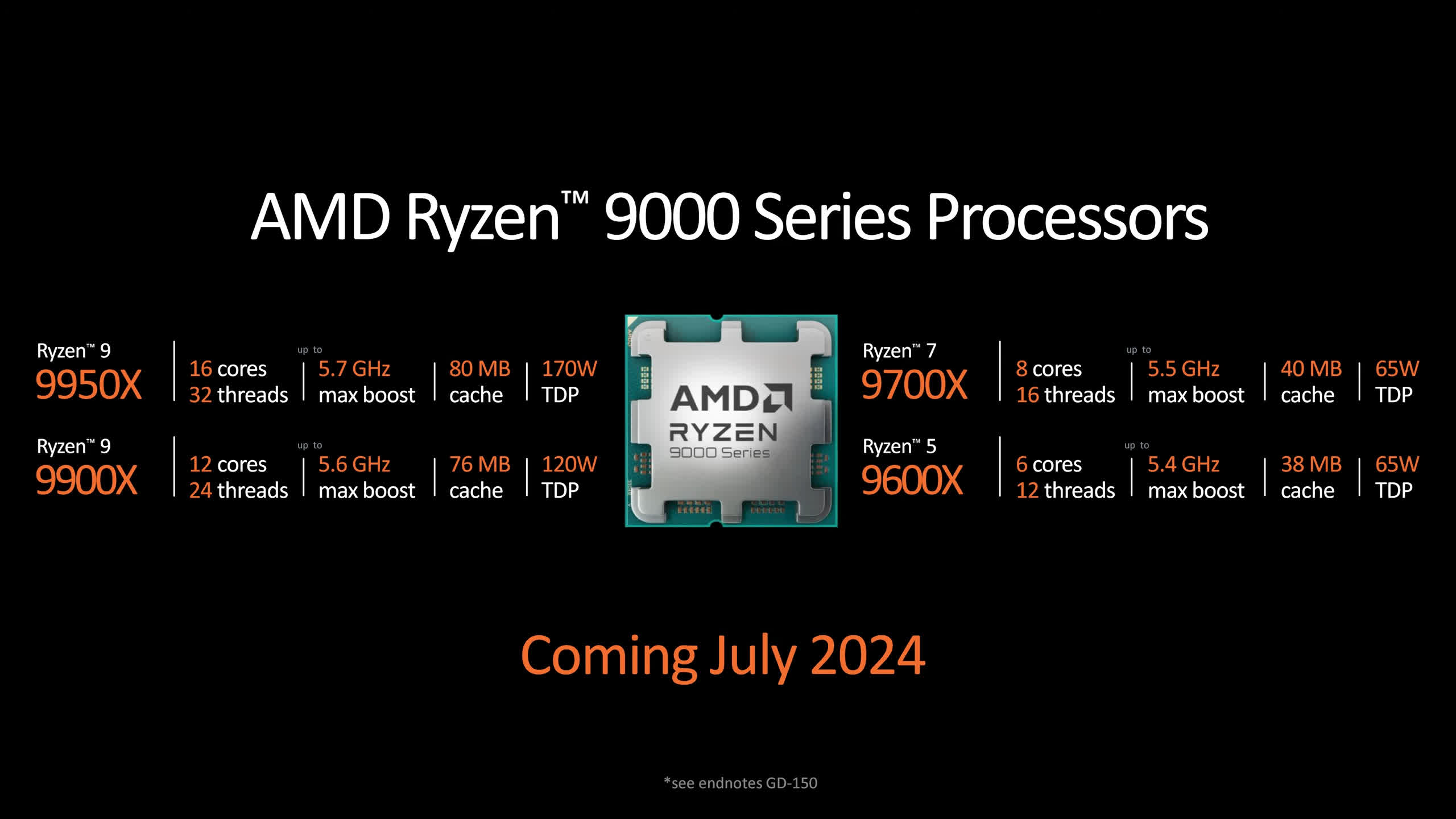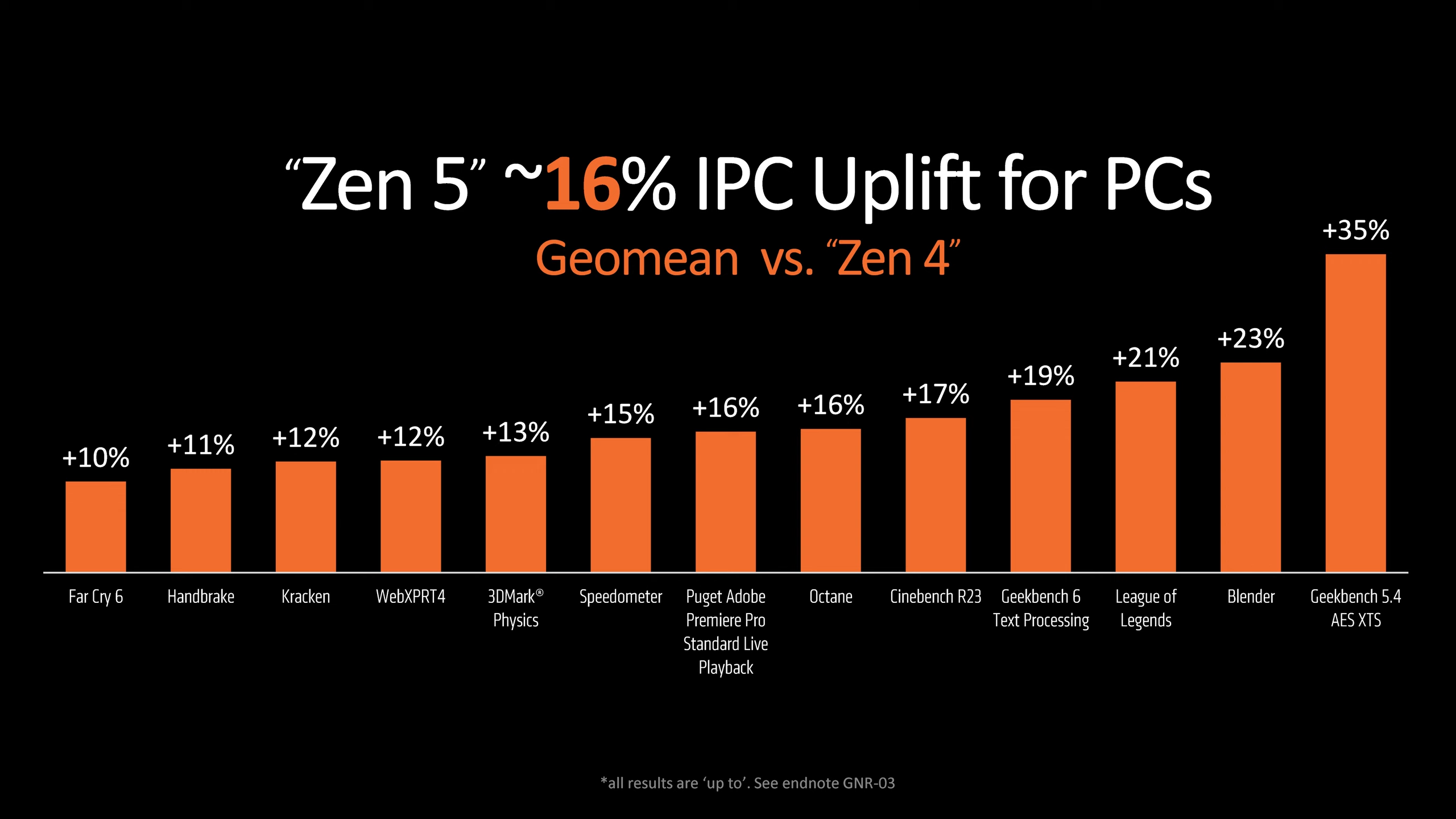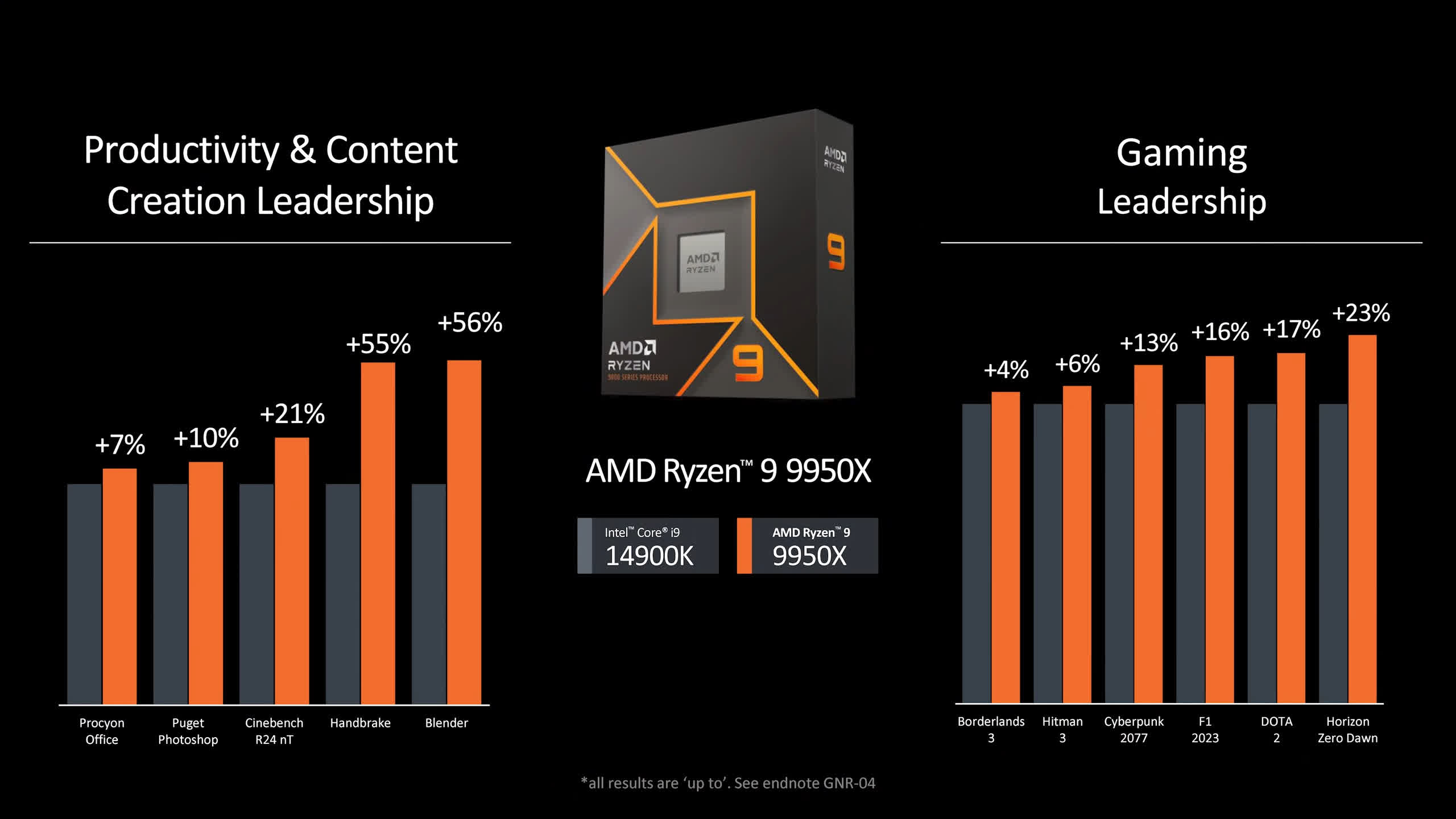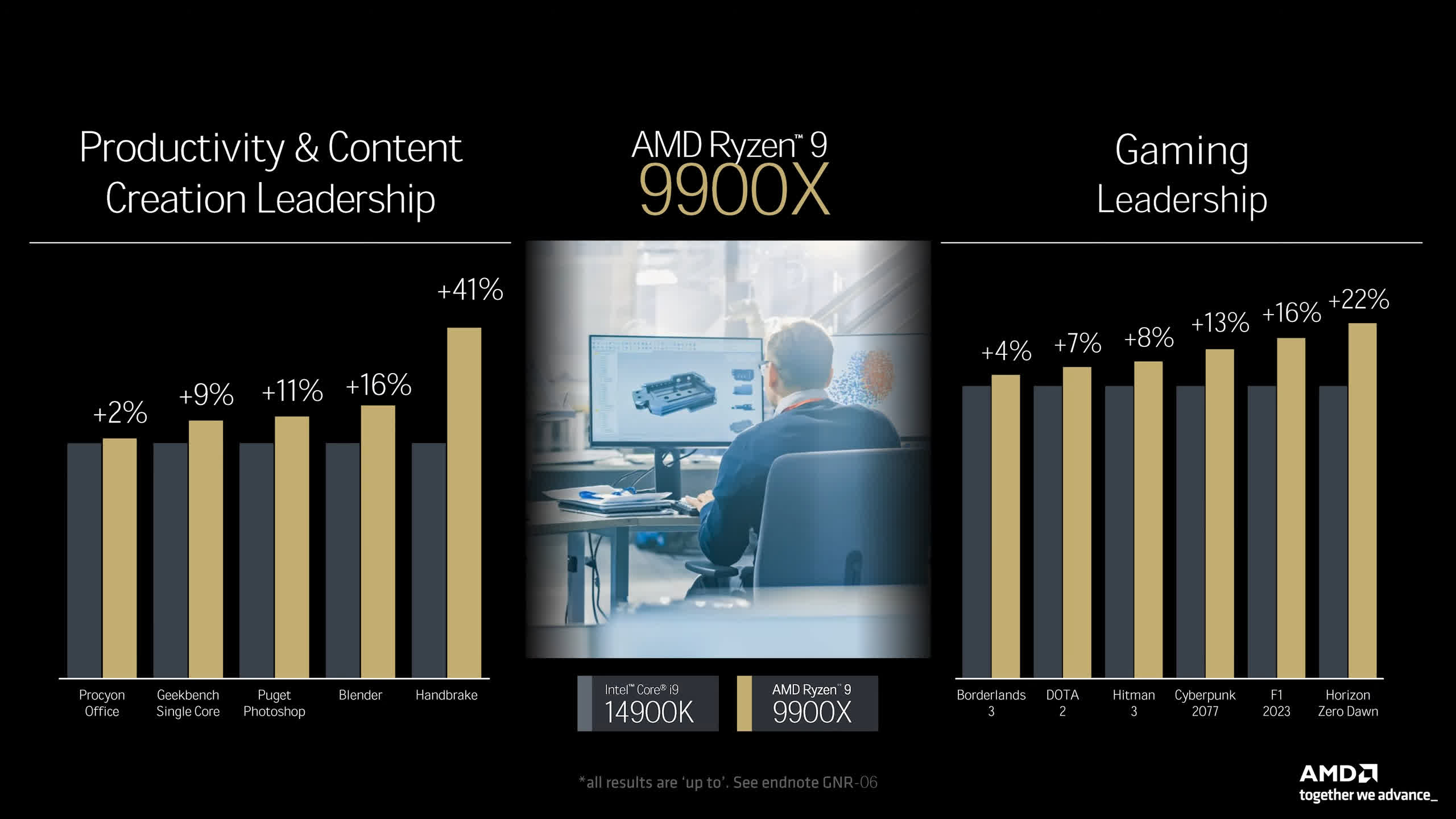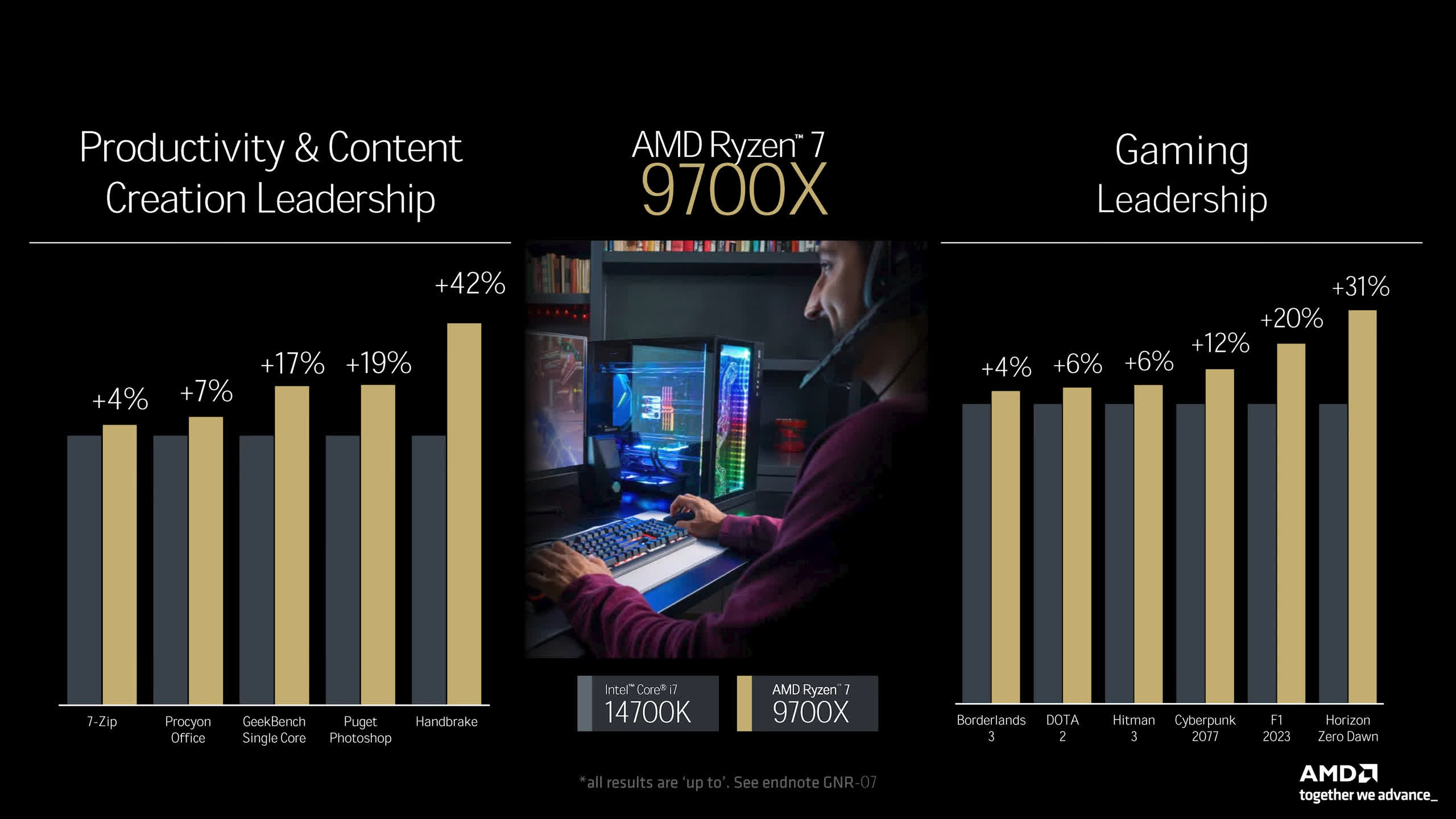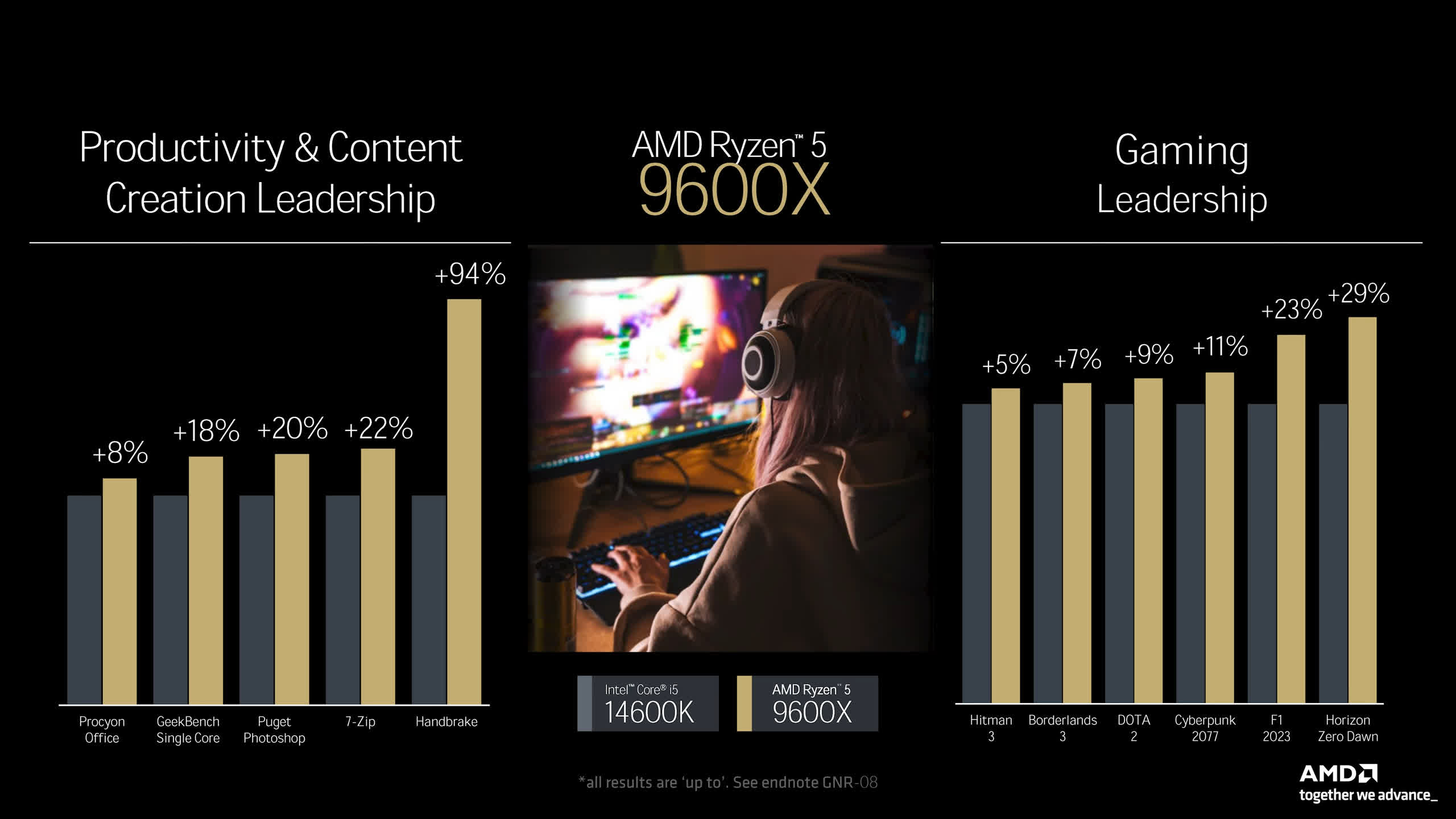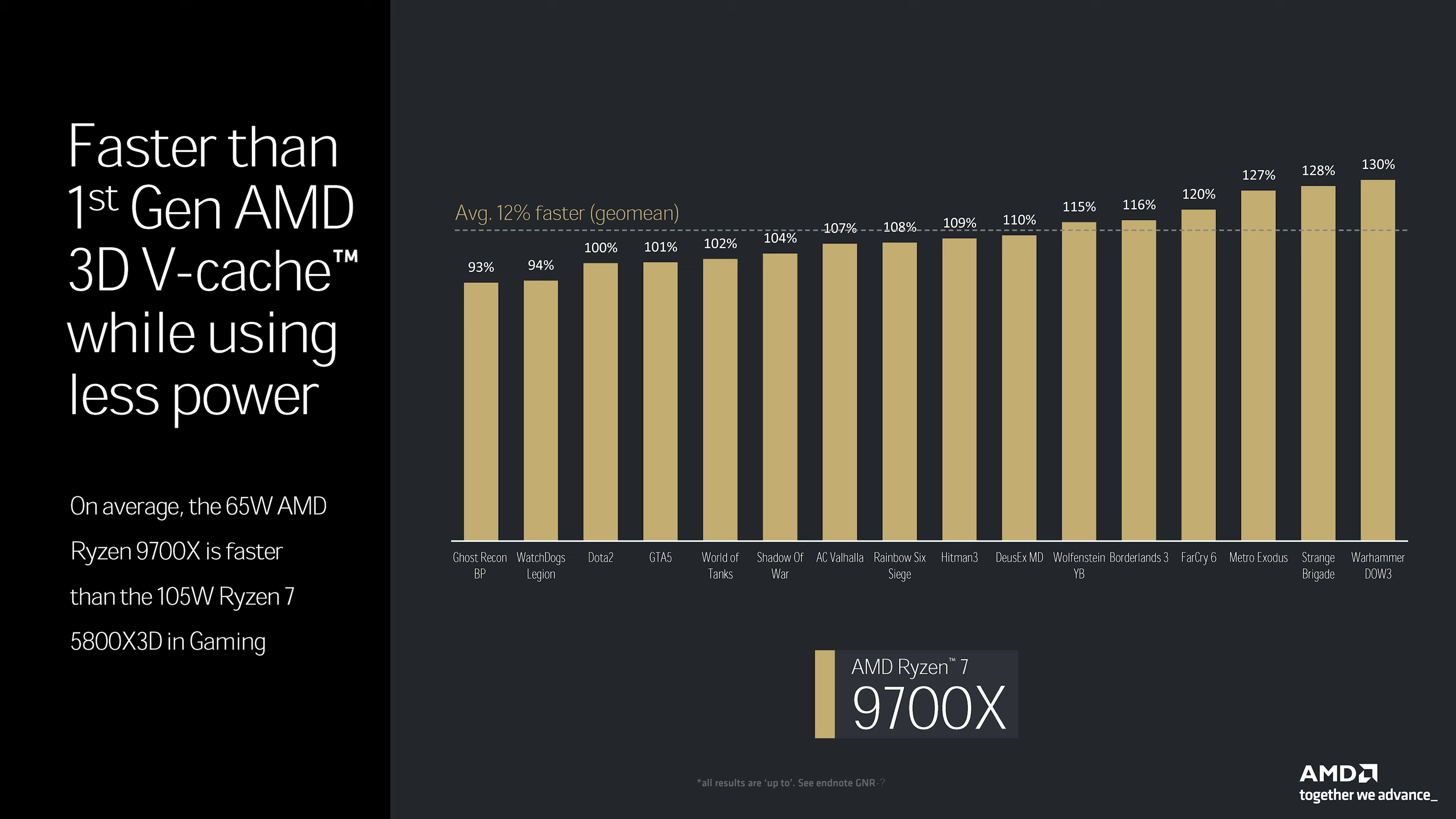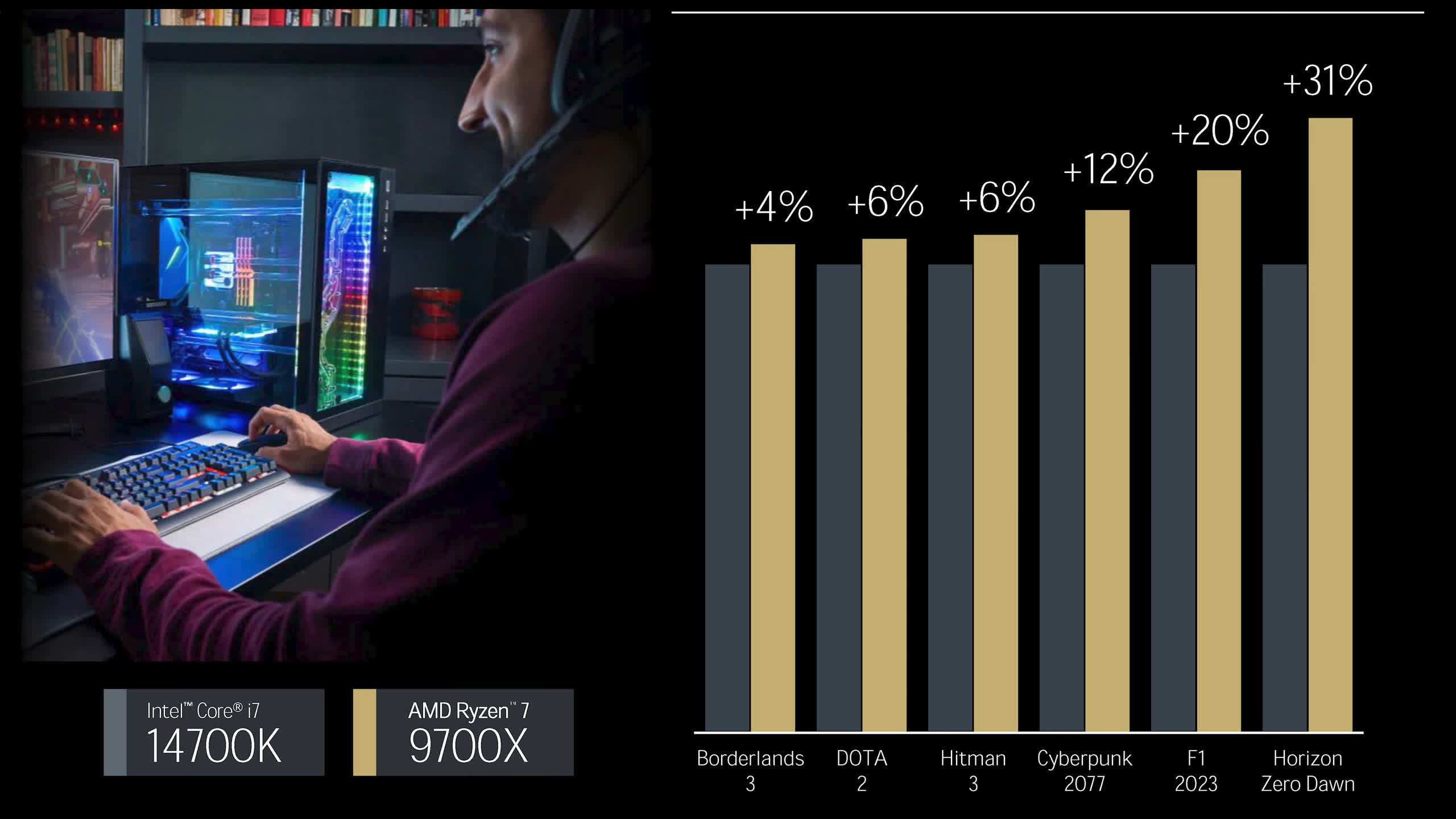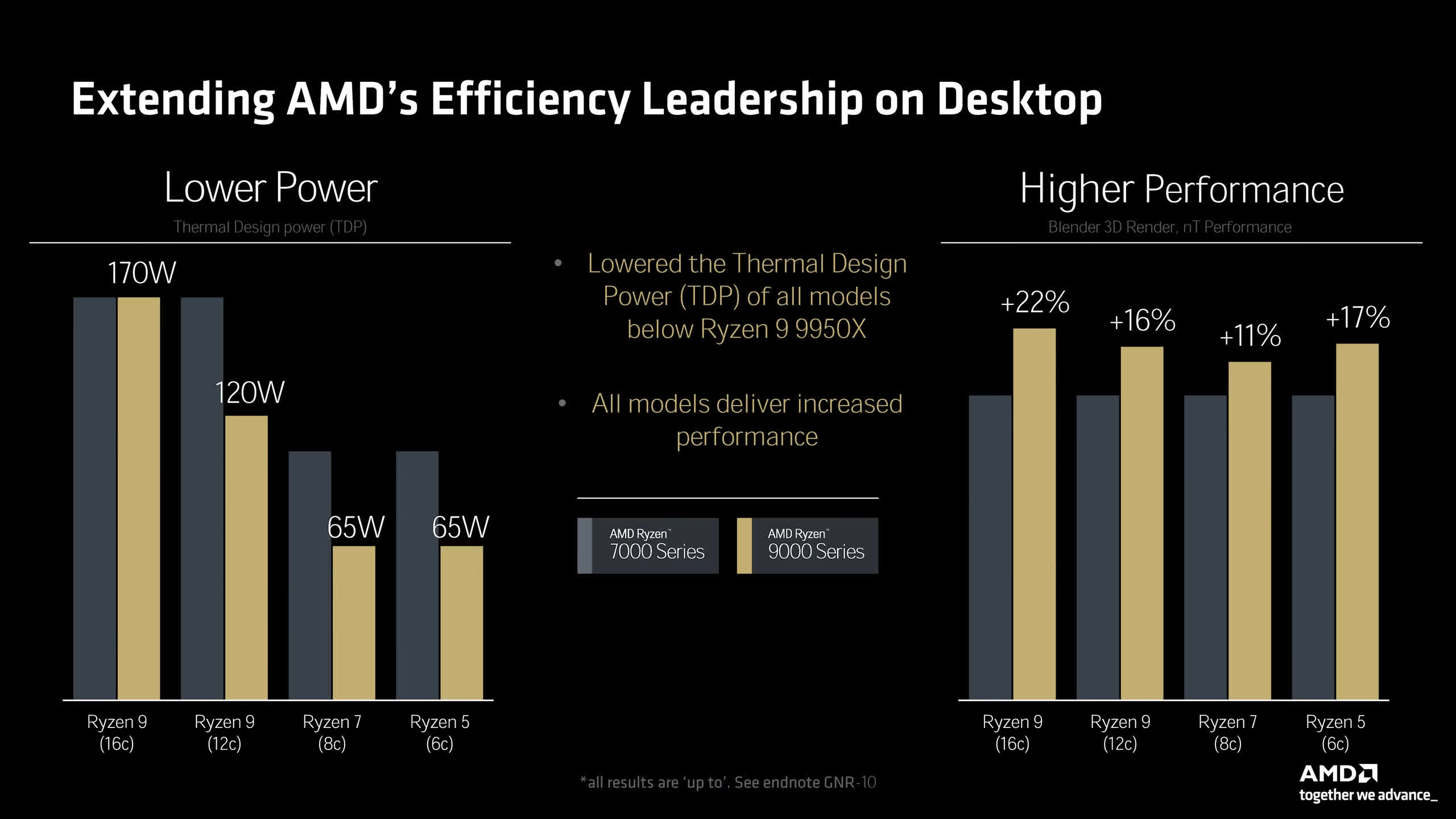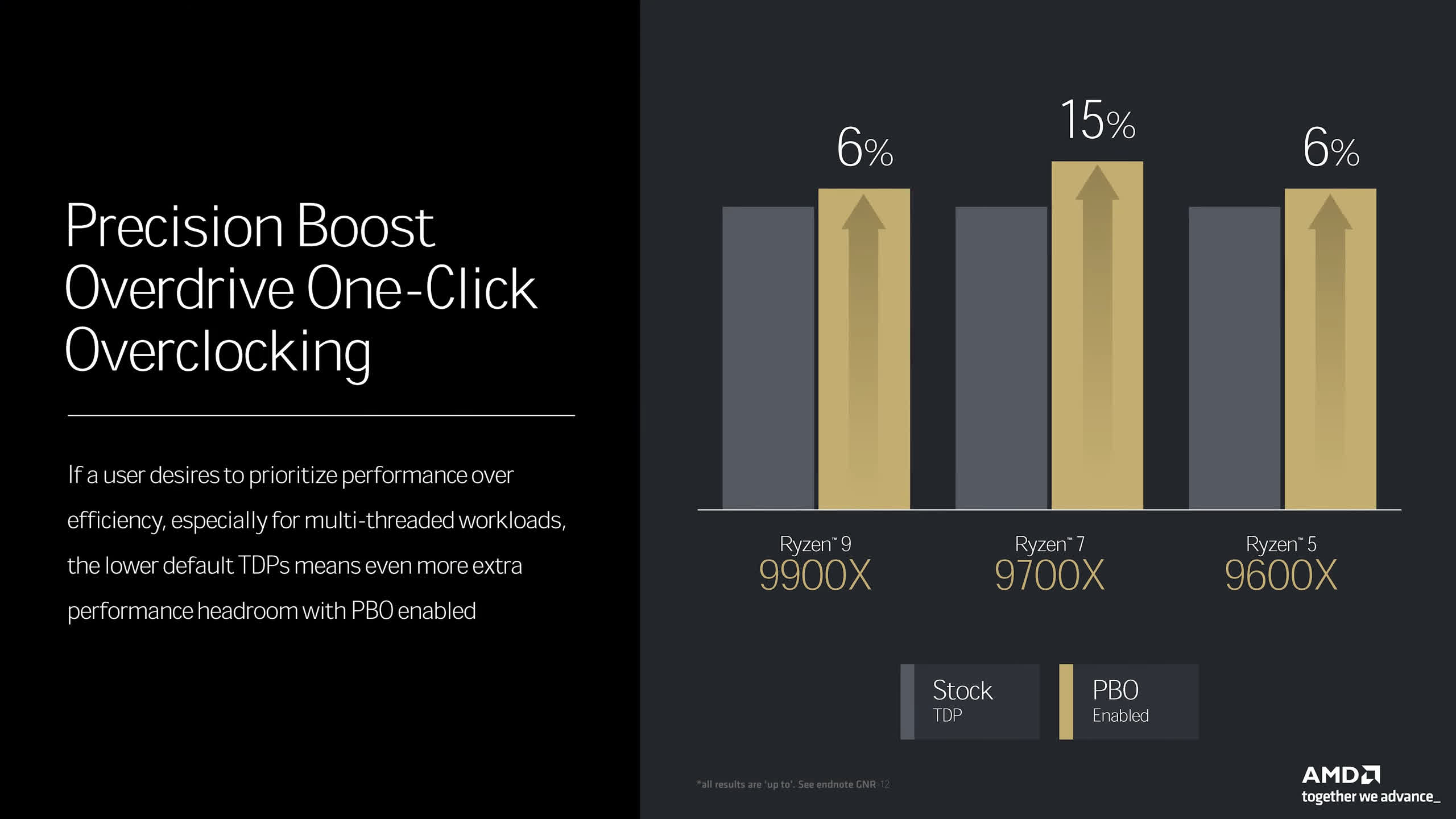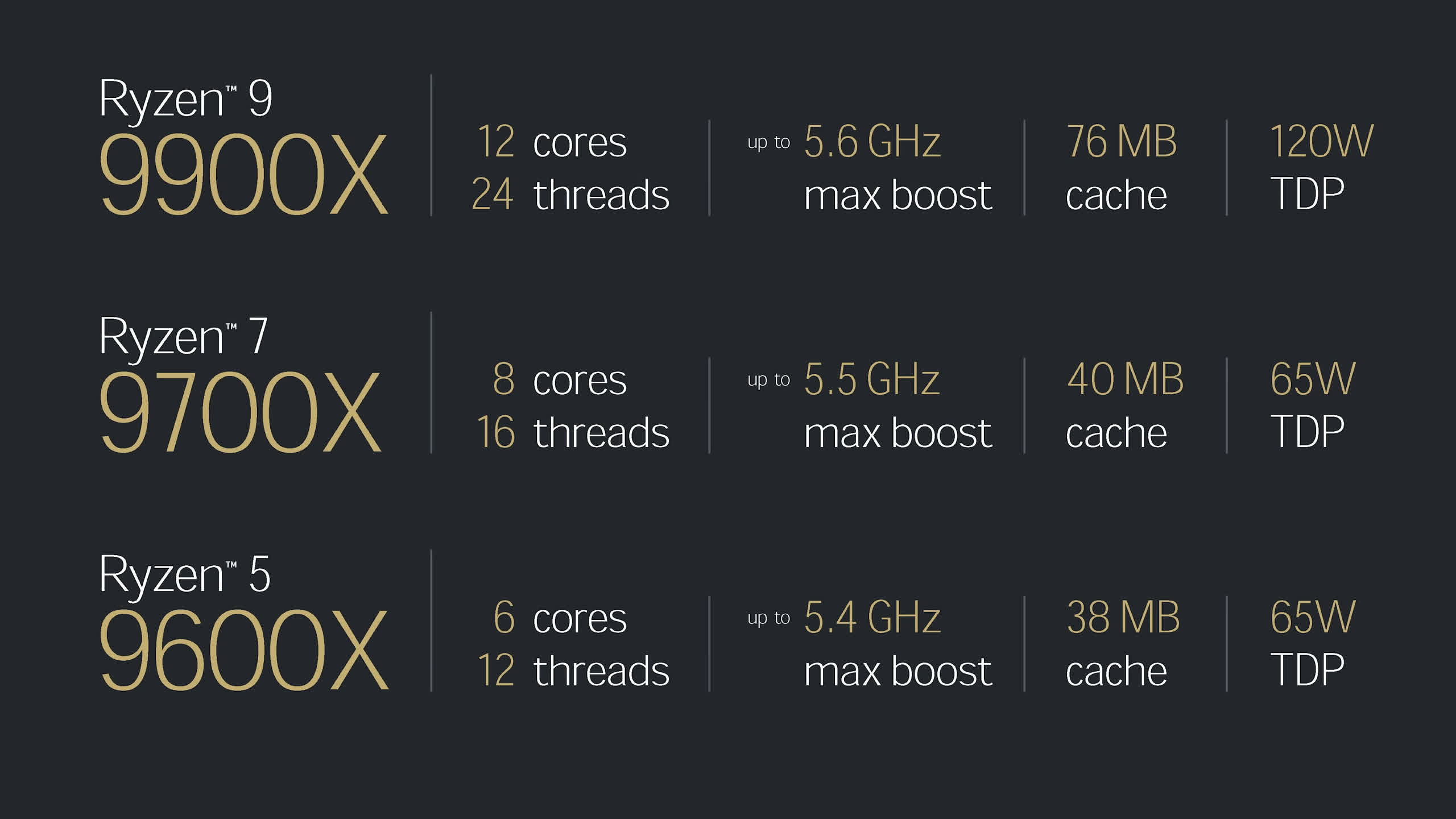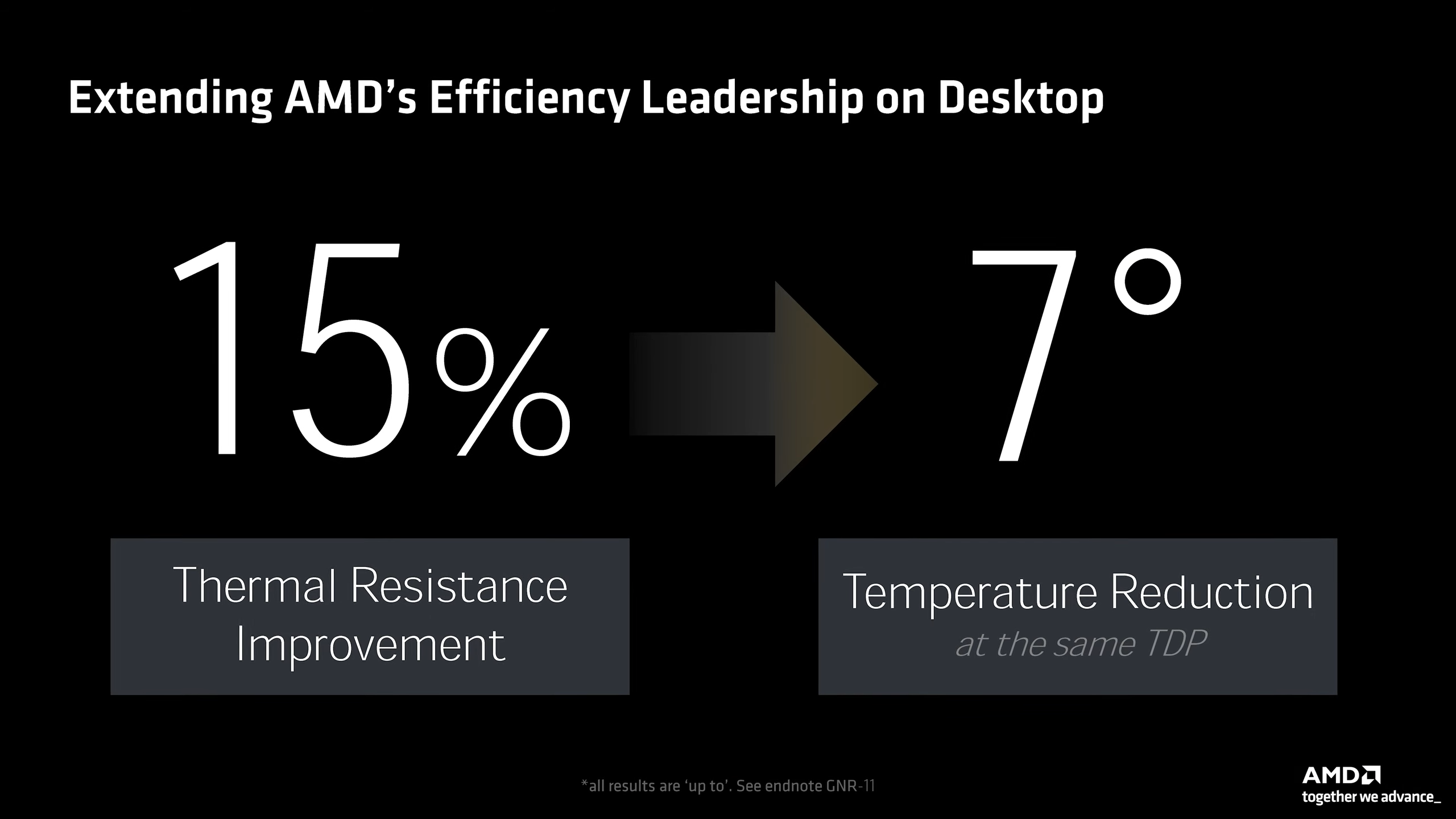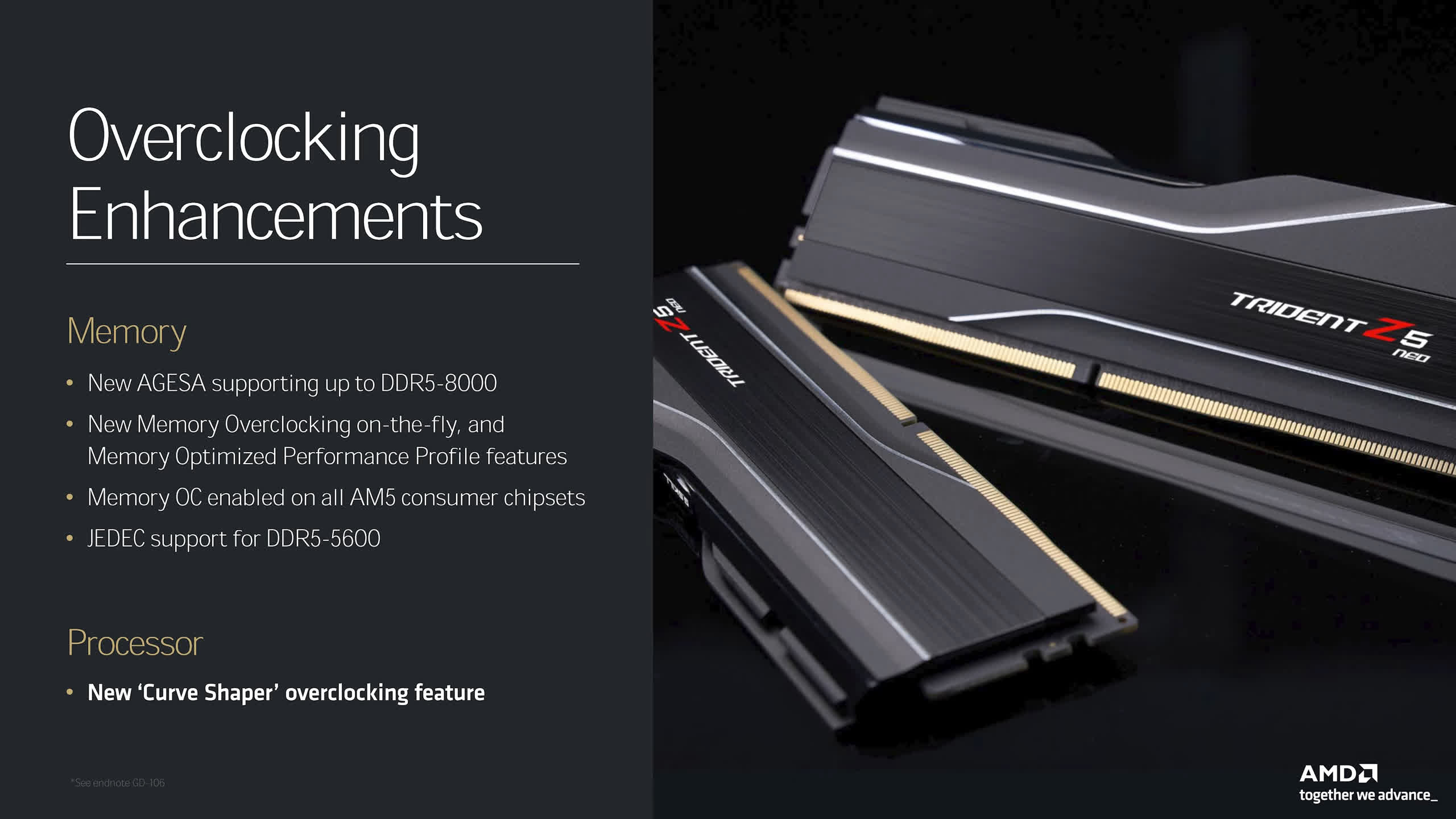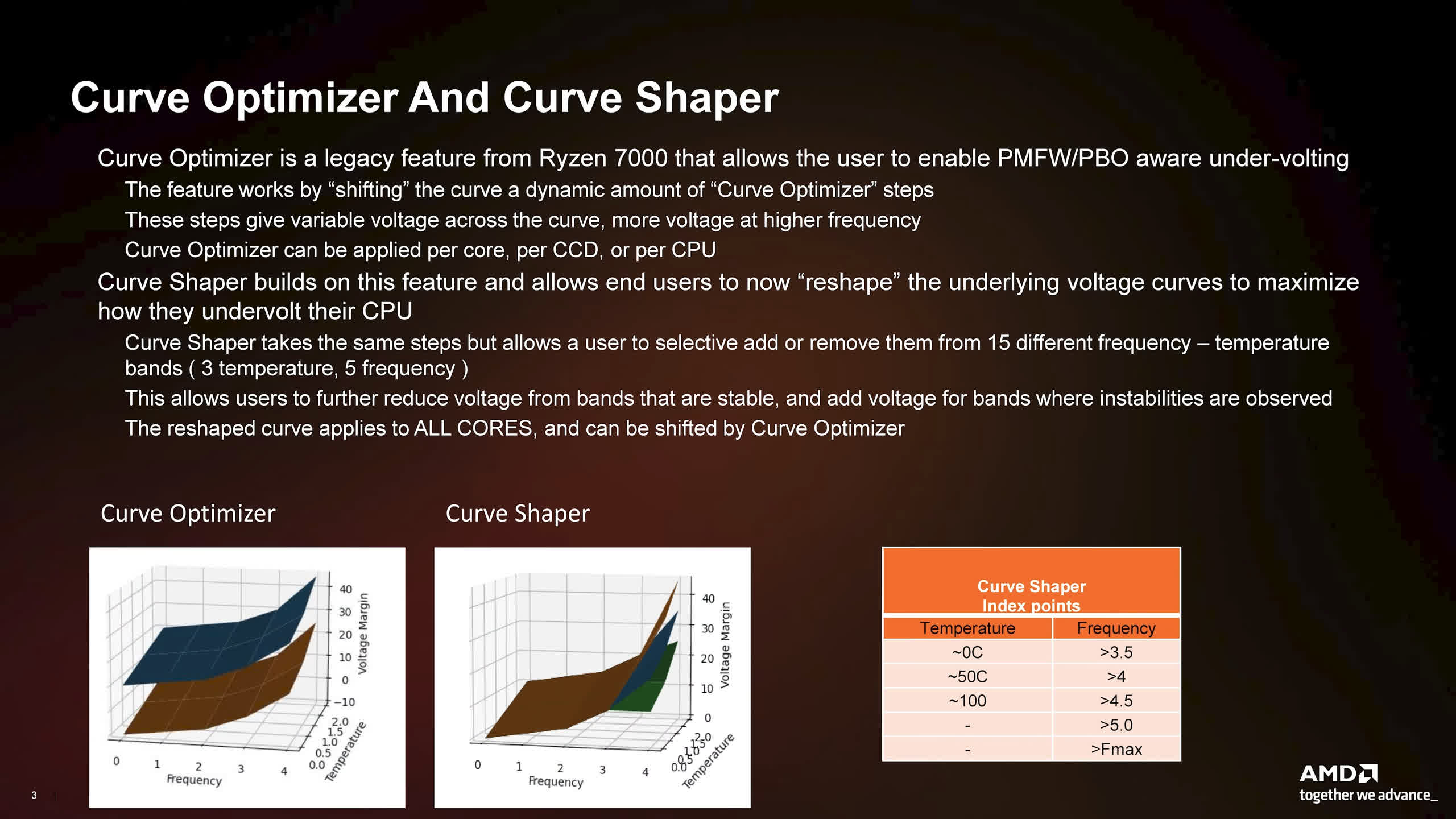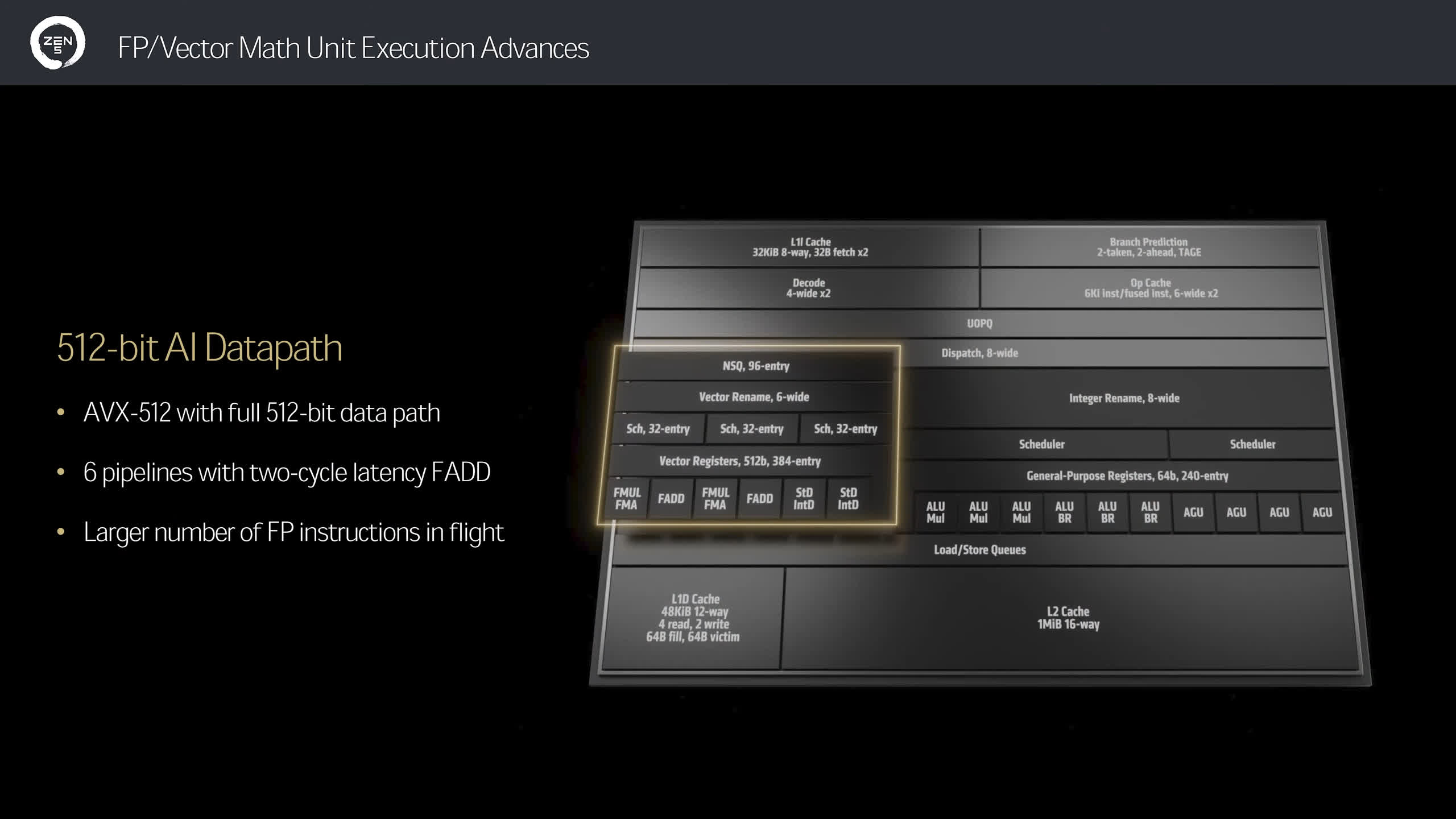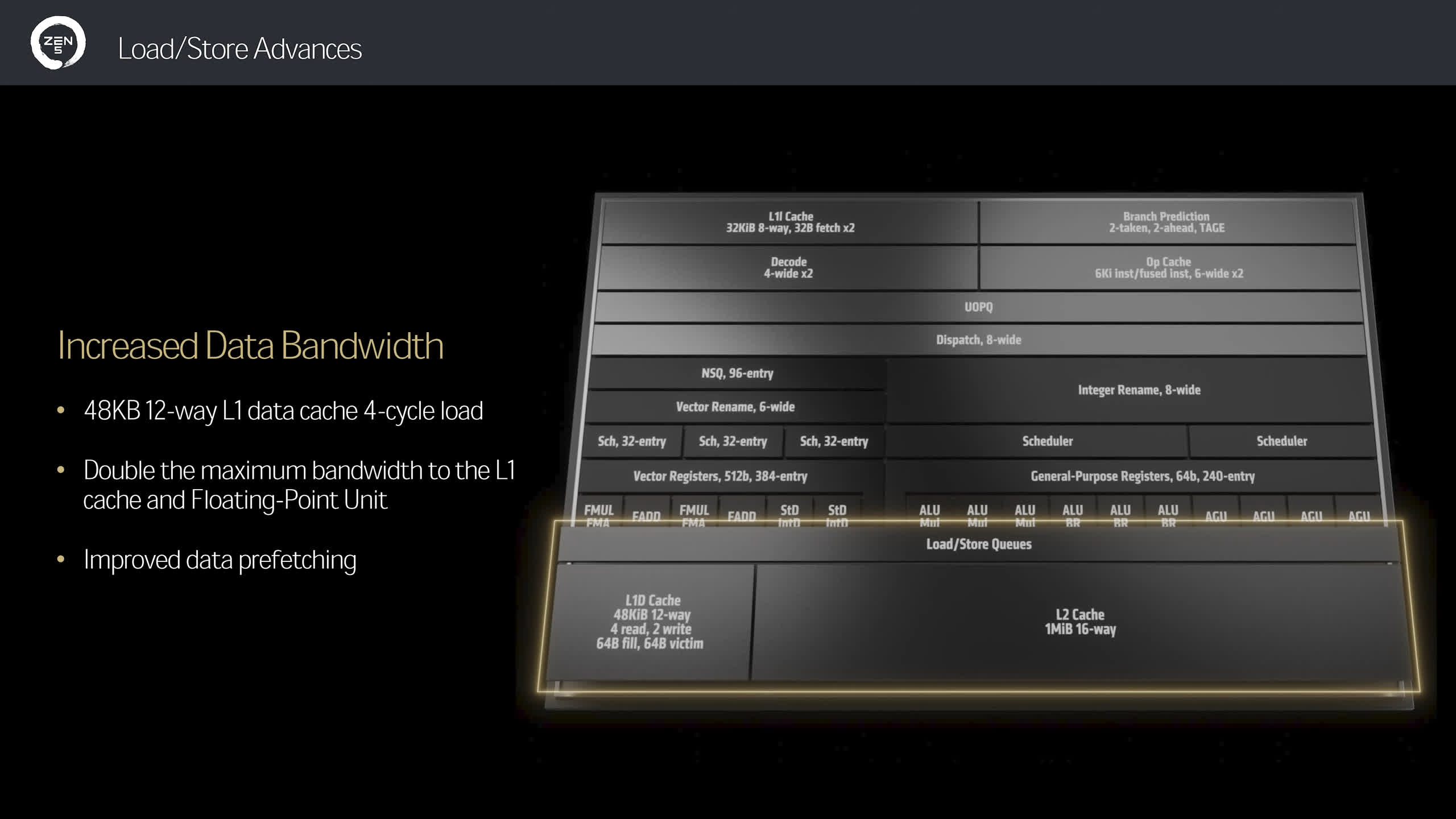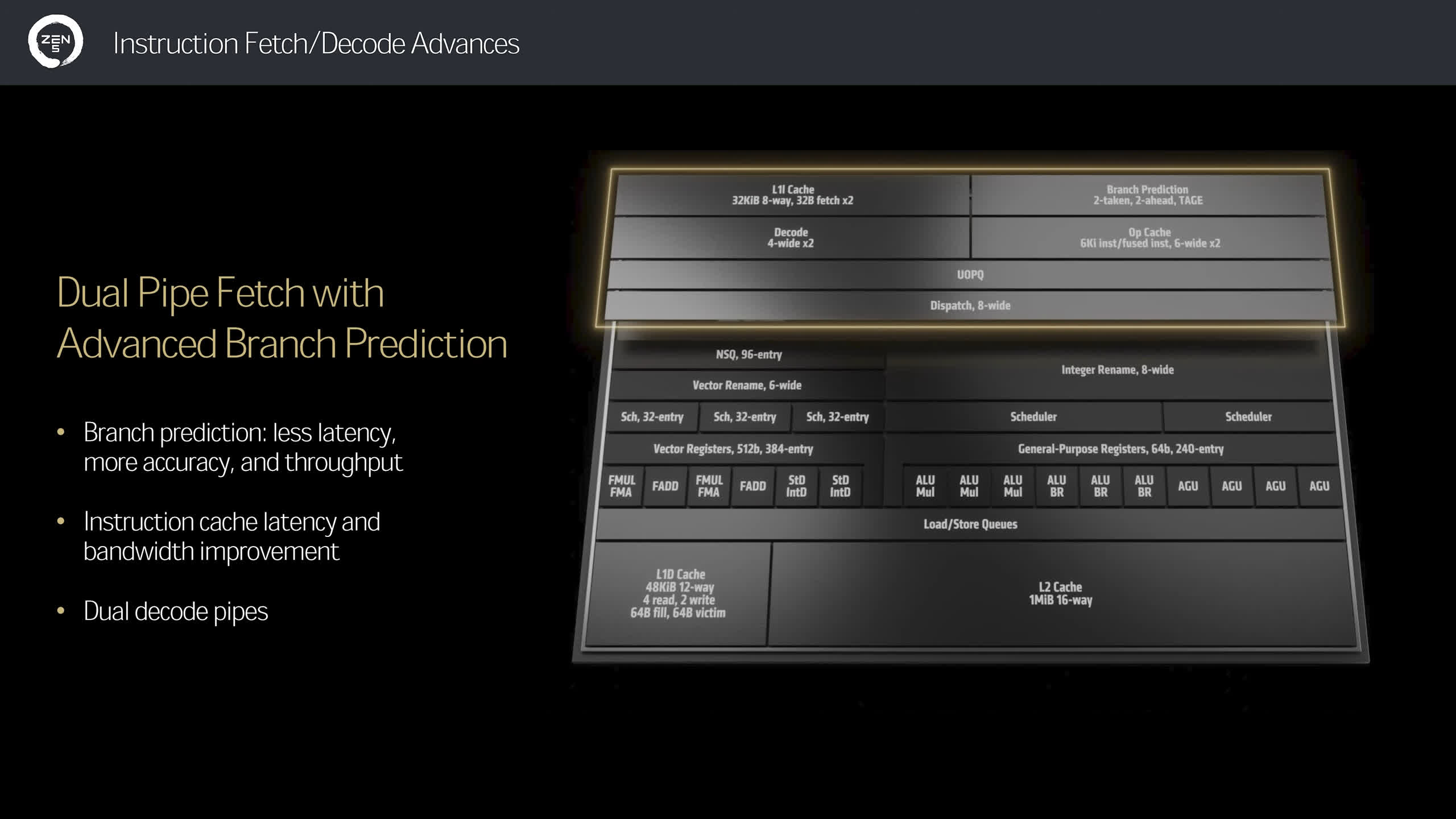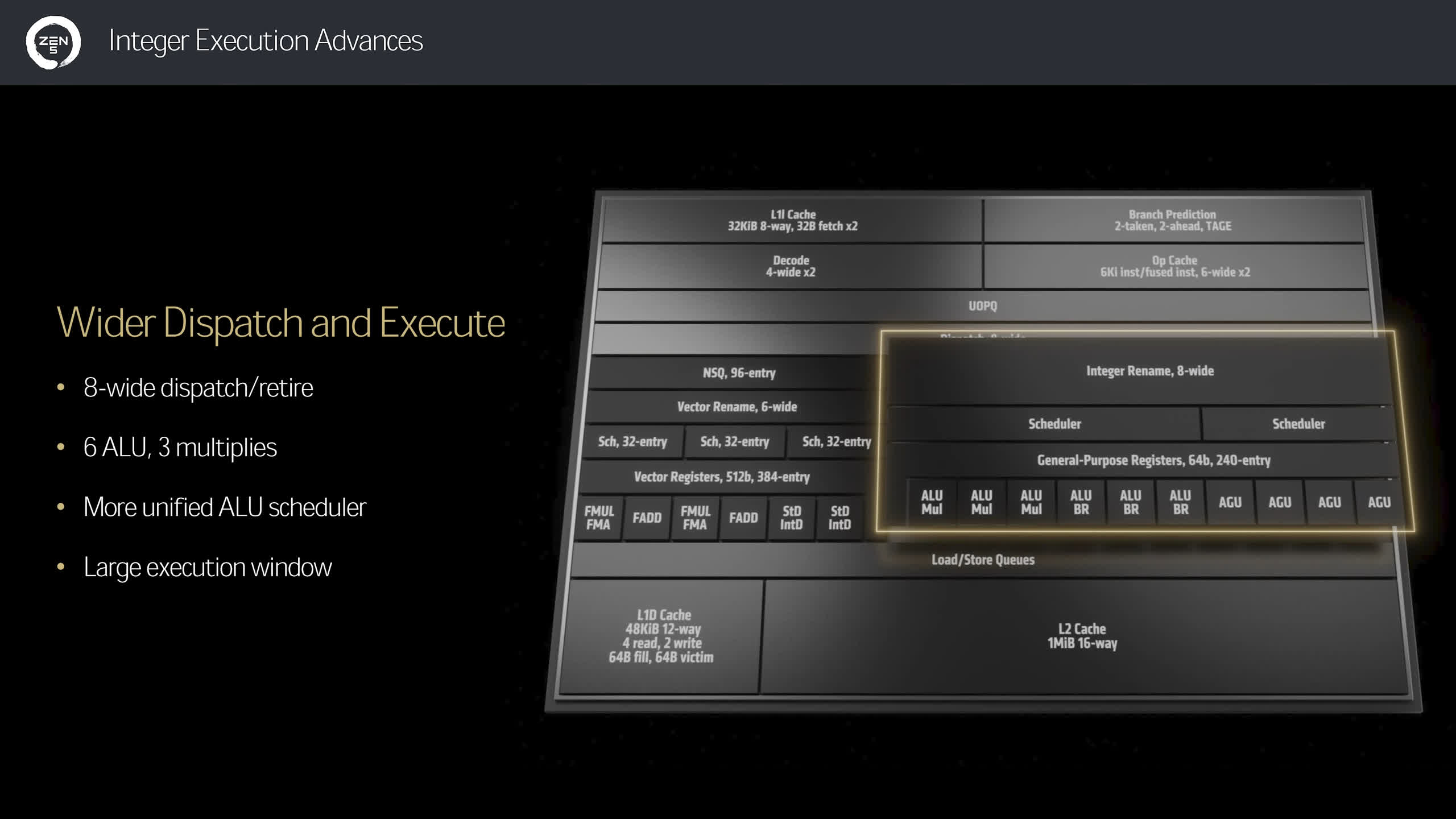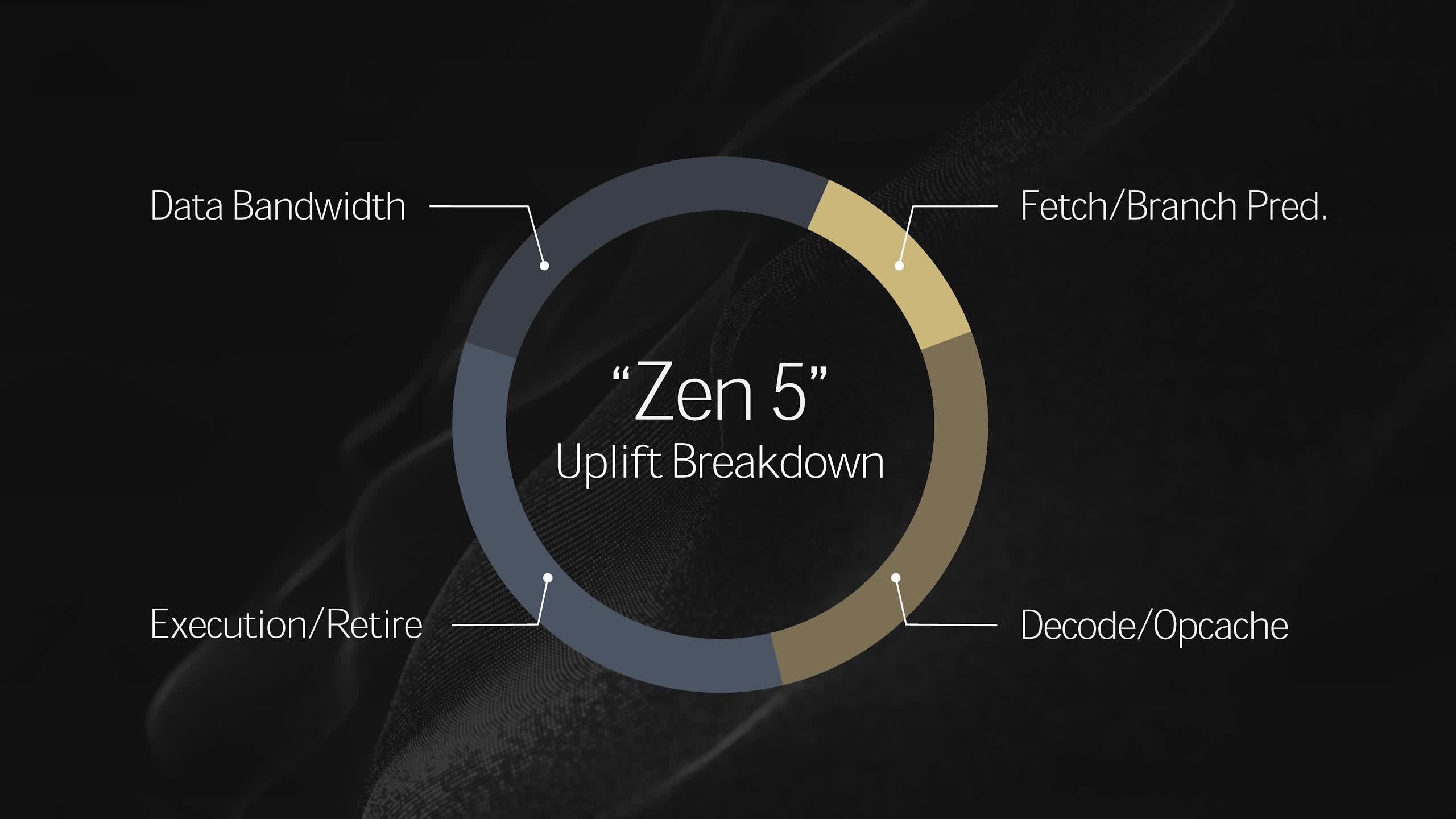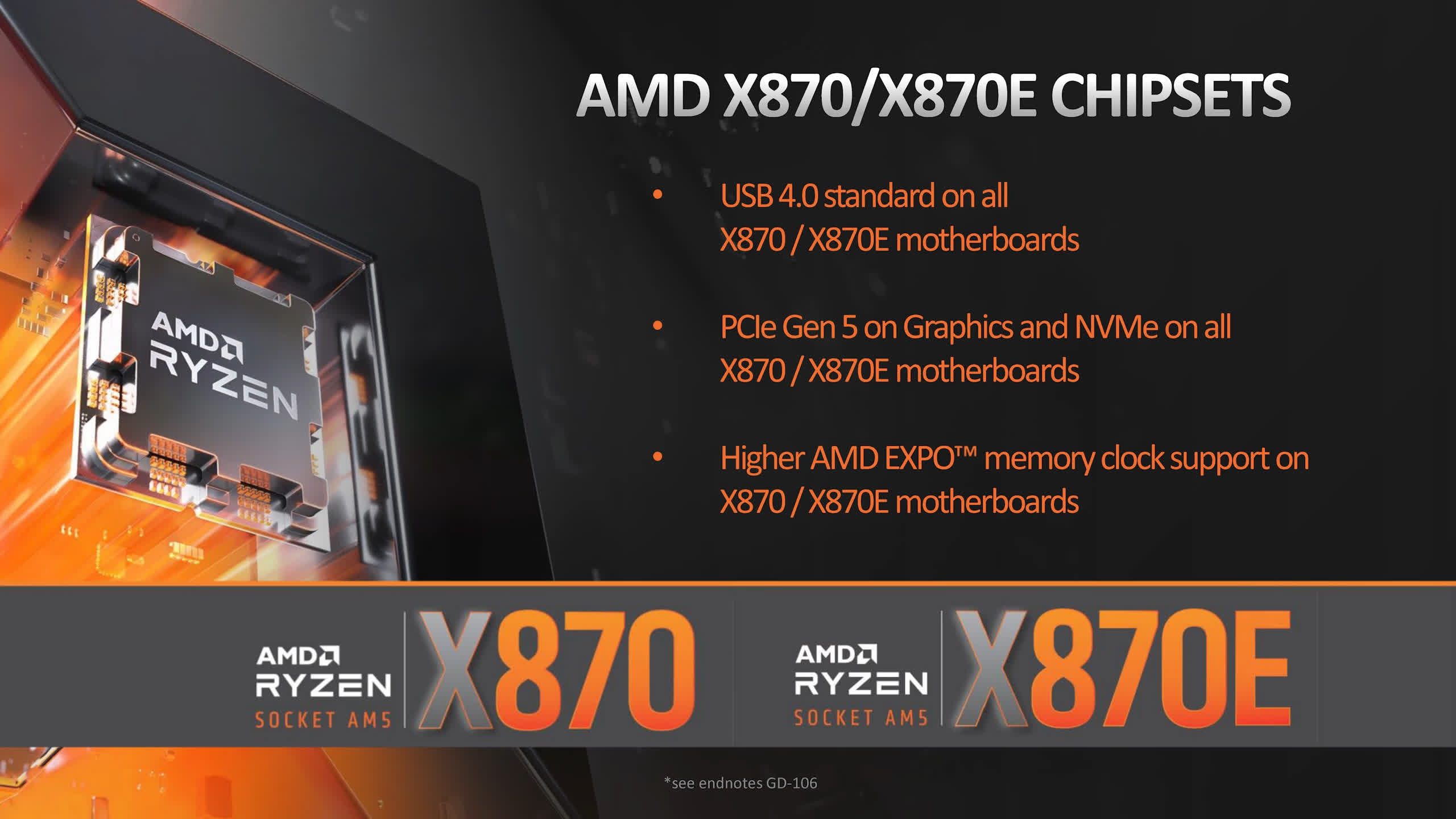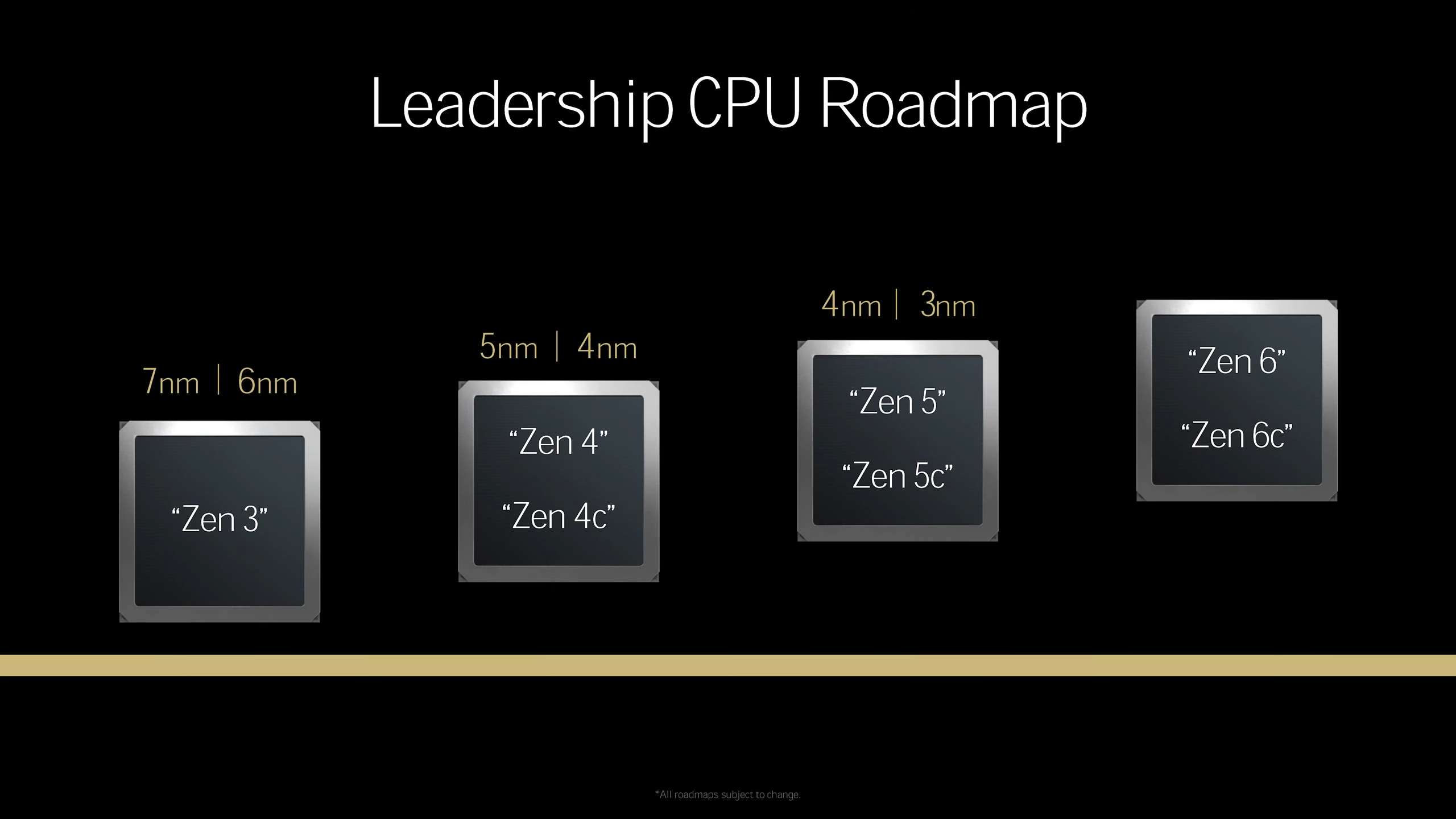AMD's new Zen 5 Ryzen 9000 processors are just around the corner, and today we can reveal a little more information about them. As a quick recap, AMD announced the Ryzen 9000 series at Computex last month. This includes four main desktop processors in a pretty standard line-up: the Ryzen 9 9950X, Ryzen 9 9900X, Ryzen 7 9700X, and Ryzen 5 9600X.
The main benefit we're getting here is a 16% average IPC uplift, similar to AMD's previous Zen architecture upgrades. Other aspects of the design remain unchanged from Ryzen 7000, including the number of CPU cores (which is still between 6 and 16 across the line-up) and peak frequencies that push up to 5.7 GHz. There are also no 3D V-Cache models as of yet, meaning the initial batch of Zen 5 CPUs tops out at 32MB of L3 cache per CCD.
We now have a release date for these processors: July 31, 2024, right at the end of AMD's initial July release window. What we don't have, though, is pricing, which is a bit strange, to be honest. AMD is going to begin selling these processors in just over two weeks, and there's no indication of how much they'll cost or how much buyers will need to save up to grab Zen 5. In contrast, when Zen 4 was announced in 2022, we had full pricing and spec information nearly a month before launch.
But we also don't really know what this means or how much to read into it. Usually, when a company doesn't want to divulge specific information, it's because the answer isn't very positive.
Most of the Zen 4 line-up is now discounted below its initial launch MSRP, sometimes by hundreds of dollars, like the 7900X, which you can grab right now for just $360. So, early pricing comparisons to full-MSRP Zen 5 models might not be all that favorable. But it could also be the case where pricing is quite competitive, and AMD doesn't want to cannibalize Zen 4 sales over the next few weeks. Apparently, we will get pricing in time for reviews, but right now we're still in the dark.
New performance claims for Ryzen 9000
What we are getting today are more first-party performance slides. Back at Computex, we got very limited performance info, mostly focusing on the Ryzen 9 9950X compared to the Core i9-14900K. Now AMD is expanding those comparisons to include the other models.
Most of these slides are pretty typical in the information they provide. The six games shown for each comparison are the same across all models. AMD is advertising that the 9950X is, on average, 13% faster than the 14900K for gaming across these titles, though, as always, first-party benchmarks should be taken with a grain of salt due to the level of cherry-picking that may be occurring with just 6 titles. With the Ryzen 9 9900X, AMD suggests 12% more performance than the 14900K, which should mean very similar gaming performance to the 16-core model.
With the 9700X, AMD is now comparing it to the 14700K, again showing a 13% performance improvement for the Zen 5 part. The 9600X is expected to be 14% faster than the Core i5-14600K based on this data as well.
What's perhaps more interesting are the productivity numbers, which appear to be more significantly cherry-picked. For example, with the 9900X versus 14900K, AMD shows Blender as one example of greater performance, but with the six and eight-core models, that benchmark is swapped out for 7-Zip, usually quite a favorable benchmark for AMD CPUs. There's also a heavy focus on single-threaded results like Procyon Office, Geekbench, and Photoshop as opposed to multi-core tasks, outside of Handbrake which is expected to benefit significantly from Zen 5's AVX-512 support.
Reading between the lines, this suggests Ryzen 9000 CPUs might not be as competitive for multi-threaded workloads compared to single-threaded workloads relative to the nearest Intel parts. E-cores are a significant part of Intel's architecture that assist massively with multi-threaded productivity apps: the 14700K features 12 E-Cores in addition to 8 P-cores, and the 14600K gives you a 6P+8E configuration. This will likely see Intel maintain their multicore productivity lead; previously we found the 14600K to be over 50% faster than the Ryzen 5 7600X in some workloads like Cinebench multi-core, which is a huge gap to bridge in a generation that sees no increase to core count.
AMD also compared the Ryzen 7 9700X to the Ryzen 7 5800X3D, claiming the new Zen 5 part is 12% faster on average than first-gen 3D V-Cache models while using less power. This is an interesting comparison given it's effectively Zen 5 versus Zen 3, not a comparison to the newer Zen 4-based 7800X3D. However, AMD did also mention that a similar comparison to the 7800X3D would show the new 9700X coming in "a couple of percentage points" faster.
All of these claims don't fully align with our current CPU gaming data, which found that the Ryzen 7 5800X3D is a little slower than typical Zen 4 non-X3D processors. It is 4% faster for the 7600X versus 5800X3D, and 8% faster comparing the 7700X versus 5800X3D. There is little to no crossover in the games tested between our test suite and AMD's – and we use an RTX 4090 while AMD typically uses a Radeon RX 7900 XTX – but this would imply only a small increase in gaming performance for the 9700X over the 7700X.
At the same time, for the 9700X to be 13% faster than the 14700K across a range of games, it would actually be faster than the 7800X3D in our data and over 30% faster than the 5800X3D. It's hard to know exactly where things will land given AMD does claim the 9700X is slightly faster than a 7800X3D. I guess you shouldn't really trust first-party benchmarks, but if this were to be true, the gap to the 5800X3D would have to be bigger, making at least one of the claims AMD has made a bit contradictory to the others and our testing.
With all of that said, AMD did compare Ryzen 9000 to Ryzen 7000 directly in Blender multi-thread, claiming a variety of performance gains while also boasting lower TDPs. But there's an important reminder here: TDPs are not an actual measurement of power consumption, merely a rating for required cooler performance. Just because the Ryzen 5 model drops from a 105W TDP to 65W TDP while improving performance by 17%, doesn't mean the actual power consumption of those parts has decreased by 40 watts.
New Zen 5 CPU features
So what else is new to learn about Zen 5 processors? Well, AMD is expecting decent gains from using Precision Boost Overdrive, especially for the Ryzen 7 9700X. There have been some rumors claiming that AMD was going to raise the TDP of the 9700X at the last minute from 65W to something higher like 120W, but this is not the case based on the information AMD is showing just two weeks out from launch.
Instead, AMD is claiming that due to lower default TDPs, PBO is going to provide more extra headroom than usual, especially for the 9700X where they are claiming a 15% performance increase.
Ryzen 9000 processors will run cooler than Ryzen 7000 due to a 15% improvement in thermal resistance, which AMD claims will result in a 7-degree Celsius temperature reduction at the same TDP.
Generally, Zen 4 processors were easy to cool due to only moderate power usage, especially compared to Intel's 14th-gen, but they did run upwards of 90C under full load. This is a nice benefit for people who are temperature sensitive and worried about cooking their CPUs, and it should also allow CPU frequencies to run higher at a given temperature.
There are additional overclocking enhancements, especially for memory. Base JEDEC memory support has increased from DDR5-5200 in Zen 4 to DDR5-5600, and there's OC support up to DDR5-8000, which AMD tells us is actually achievable in real-world workloads, but the sweet spot will be lower. But the most interesting inclusion here is something called Memory Optimized Performance Profile.
Basically, what this means is that memory frequencies and timings can be adjusted on the fly depending on the workload. This allows the benefits of high-frequency memory and low-latency memory without needing to constantly tweak things in the BIOS.
The way it was explained is that if you purchase a high-end memory kit, e.g., DDR5-8000, in some workloads, it would push the frequency right up to 8,000 speed at looser timings like CL38, because usually when running at higher speeds you can't have super tight timings.
But then for some games, as an example, the system will automatically lower the frequency and tighten timings if necessary. That way your DDR5-8000 kit might actually be beneficial across a broad range of use cases instead of being a bit useless for gaming due to looser timings and worse latency. We'll have to see how effective it is and how well it tunes memory on the fly.
For processor overclocking, there's also an evolution of the curve optimizer feature called curve shaper, which allows for more control over the voltage-frequency curves at differing operating temperatures.
Zen 5 architecture
AMD made several deeper disclosures on the Zen 5 architecture, the highlights are a full 512-bit data path for AVX-512 instructions, an increase in the L1 data cache from 32 kB 8-way to 48 kB 12-way, a doubling of the maximum L1 cache bandwidth, and better branch prediction.
There's an increase from 6-wide dispatch in Zen 4 to 8-wide dispatch, an increase in ALUs from 4 to 6, and there's now a dual decoding pipeline in the front end.
This is how AMD sees each of these architectural improvements impacting the final IPC and overall performance. The big driver of gains has been the improvements to execution and decoding, with data bandwidth also a significant factor.
New AMD B850 and B840 chipsets
AMD has announced two new chipsets joining the 800 series. At Computex, we got X870 and X870E as flagship chipsets and saw plenty of new boards across the various vendors. Now AMD is also disclosing the widely rumored B850 and B840 chipsets, with a breakdown seen in this handy table.
The basics are that X870 and X870E mandate USB 4 and PCIe 5.0 for graphics and the primary M.2 slot. B850 reduces the requirements for both to USB 3.2 20 Gbps and PCI 5.0 just for the primary NVMe drive, with 5.0 for graphics being optional. B840 cuts things back further, only supporting PCIe 3.0 instead of 4.0 as the baseline, dropping USB 3.2 support down to 10 Gbps and removing support for CPU overclocking.
So where do things fall compared to the existing 600 series?
AMD X870 and X870E are a step up from the X670 series in that all boards will now support USB 4, and the non-E boards will have more PCIe 5.0 connectivity. B850 is a mixture of B650 and B650E but mostly a refresh of that chipset.
B840 ends up a tier below A620 – while both chipsets drop support for overclocking and reduce USB speeds to 10 Gbps, B840 further reduces the PCIe bus to 3.0 whereas A620 remains PCIe 4.0. With that said, other aspects of B840 could end up a tier above A620, such as the number of USB ports that are supported. All 600 series chipsets support memory overclocking.
AMD also says that new boards have improved memory routing to allow for more reliable memory performance at higher speeds, like DDR5-8000 that was previously mentioned, although we'll have to see which boards receive these improvements. However, as mentioned at Computex, these new 800 series motherboards will not be released alongside Zen 5, instead coming several months later.
Finally we also got a minor roadmap update, with a slide featuring Zen 6 on it. Absolutely zero other details so it's really just a hype slide to be honest, no indication of when we can expect Zen 6, or what sort of process node it's using, just nothing here to go on whatsoever which is a little laughable.
All AMD has said is that Zen 6 is on track, whatever that means. The gap between Zen 3 and Zen 4 was roughly 22 months, and there's the same 22 month gap between Zen 4 and Zen 5. Based on that we should expect Zen 6 in May 2026 at a complete guess.
And that does it for today's Zen 5 news. In just a few weeks, you should see our full reviews of these processors along with plenty of follow-up content in the months to follow.
AMD teases Ryzen 9000 performance ahead of July 31 launch, details B850 and B840 chipsets
